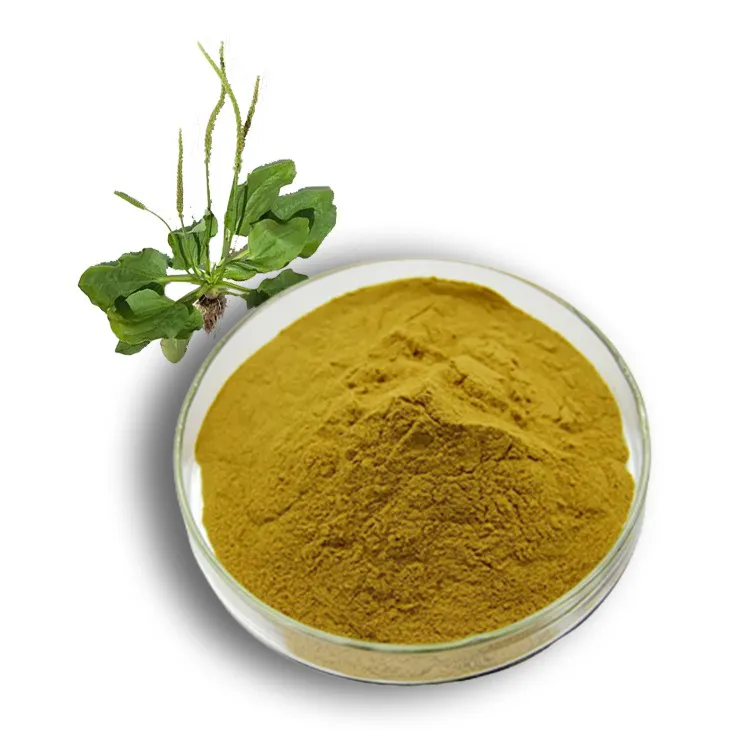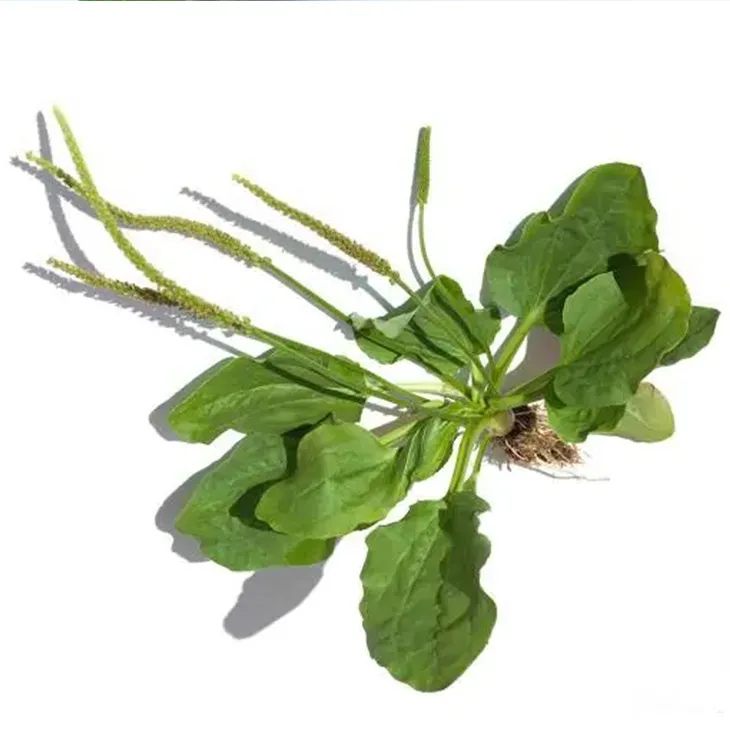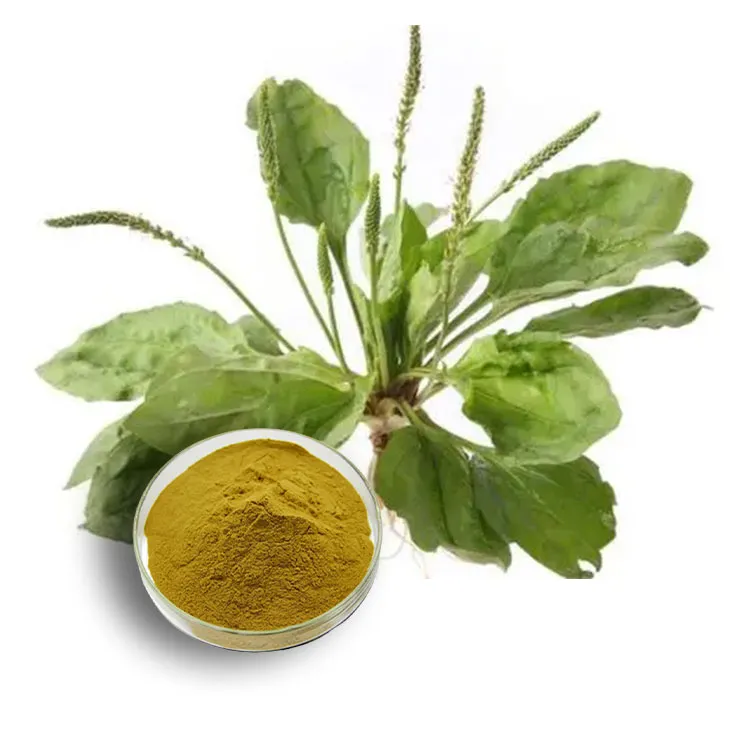- 0086-571-85302990
- sales@greenskybio.com
From Myth to Medicine: Scientific Research on Plantain Extract's Health Benefits
2024-07-04

1. Introduction
For centuries, plantain has been a part of human folklore and traditional medicine across various cultures. Plantain is a common plant that can be found in many parts of the world. In the past, it was often used for treating various ailments based on anecdotal evidence and cultural beliefs. However, in recent years, modern scientific research has started to uncover the real health benefits of Plantain extract, bridging the gap between myth and evidence - based medicine.

2. Antioxidant Capabilities of Plantain extract
2.1 What are Antioxidants?
Antioxidants are substances that can prevent or slow damage to cells caused by free radicals. Free radicals are unstable molecules that are produced in the body during normal metabolic processes, as well as due to environmental factors such as pollution, radiation, and smoking. Excessive free radicals can lead to oxidative stress, which has been linked to a variety of health problems including heart disease, cancer, and neurodegenerative diseases.
2.2 Plantain extract as an Antioxidant Source
Scientific studies have shown that plantain extract contains a variety of antioxidant compounds. These include flavonoids, phenolic acids, and other phytochemicals. For example, one study found that certain flavonoids in plantain extract have the ability to scavenge free radicals effectively. Another research indicated that the phenolic acids in plantain extract can neutralize the harmful effects of oxidative stress. This antioxidant activity of plantain extract may contribute to its potential role in preventing chronic diseases.

3. Impact on Digestive Health
3.1 Digestive System Basics
The digestive system is responsible for breaking down food into nutrients that can be absorbed by the body. It includes organs such as the stomach, intestines, and liver. A healthy digestive system is crucial for overall well - being, as any disruption in digestion can lead to problems like indigestion, constipation, and diarrhea.
3.2 How Plantain Extract Helps Digestive Health
- Fiber Content: Plantain extract is rich in dietary fiber. Fiber helps to add bulk to the stool, promoting regular bowel movements. This can prevent constipation and keep the digestive tract functioning smoothly.
- Anti - Inflammatory Properties: Inflammation in the digestive tract can cause discomfort and various digestive disorders. Plantain extract has been found to possess anti - inflammatory properties. It can reduce inflammation in the gut, which may help in alleviating symptoms of conditions like irritable bowel syndrome (IBS).
- Prebiotic Effects: Some components in plantain extract act as prebiotics. Prebiotics are substances that feed the beneficial bacteria in the gut. By promoting the growth of these good bacteria, plantain extract can help to improve the balance of the gut microbiota, which is essential for a healthy digestive system.

4. Plantain Extract in the Fight Against Chronic Diseases
4.1 Cardiovascular Diseases
- Blood Pressure Regulation: Some studies suggest that plantain extract may have a role in regulating blood pressure. High blood pressure is a major risk factor for cardiovascular diseases. The compounds in plantain extract may help to relax blood vessels, reducing the pressure on the arterial walls.
- Cholesterol Management: Plantain extract may also affect cholesterol levels. It has been proposed that certain components in the extract can inhibit the absorption of cholesterol in the intestines, leading to a reduction in blood cholesterol levels. Lower cholesterol levels are associated with a decreased risk of heart disease.
4.2 Cancer
- Anticancer Potential: Although more research is needed, preliminary studies have shown that plantain extract may possess anticancer properties. Some of the phytochemicals in the extract have been shown to interfere with the growth and spread of cancer cells in vitro. For example, certain flavonoids may induce apoptosis (programmed cell death) in cancer cells.
- Enhancing Immune Response: A healthy immune system is crucial for fighting cancer. Plantain extract may help to boost the immune system, enabling the body to better detect and eliminate cancer cells. It can stimulate the production of immune cells and enhance their activity.
4.3 Diabetes
- Blood Sugar Control: Plantain extract may play a role in controlling blood sugar levels. It can affect the absorption and metabolism of carbohydrates, which are the main source of blood sugar. By slowing down the digestion and absorption of carbohydrates, plantain extract can help to prevent rapid spikes in blood sugar levels.
- Reducing Insulin Resistance: Insulin resistance is a common problem in diabetes. Some research suggests that plantain extract may help to improve insulin sensitivity, allowing cells to respond better to insulin. This can help in the management of diabetes and reduce the risk of complications associated with the disease.
5. From Folklore to Pharmacy: The Future of Plantain Extract
5.1 Current Research and Development
At present, there is an increasing amount of research focused on plantain extract. Scientists are trying to isolate and purify the active compounds in the extract to better understand their mechanisms of action. Pharmaceutical companies are also showing interest in developing plantain - based drugs or dietary supplements. However, more clinical trials are needed to confirm the efficacy and safety of plantain extract for various health conditions.
5.2 Challenges and Opportunities
- Standardization: One of the main challenges is the standardization of plantain extract. Since the composition of plantain can vary depending on factors such as the species, growing conditions, and extraction methods, it is difficult to ensure a consistent product. Standardizing the extract will be crucial for its development as a reliable medicine or supplement.
- Regulatory Approval: Obtaining regulatory approval for plantain - based products can be a complex process. Regulatory agencies require extensive evidence of safety and efficacy before allowing a product to be marketed. This means that more research, especially large - scale clinical trials, is needed to meet the regulatory requirements.
- Opportunities for Alternative Medicine: Despite the challenges, plantain extract offers great opportunities for the field of alternative medicine. As more people are interested in natural remedies, plantain extract could be developed into a popular and effective alternative treatment option for various health problems.
6. Conclusion
Plantain extract has come a long way from being a part of folklore to becoming a subject of scientific research. Its antioxidant capabilities, positive impact on digestive health, and potential role in fighting chronic diseases make it a very promising substance. While there are still many challenges to overcome in terms of its development as a medicine or supplement, the future looks bright for plantain extract. Continued research and development are likely to unlock even more of its health benefits and bring it closer to mainstream medicine.
FAQ:
What are the antioxidant capabilities of plantain extract?
Plantain extract contains various bioactive compounds such as flavonoids and phenolic acids. These components are known to have antioxidant properties. Antioxidants in plantain extract can neutralize free radicals in the body. Free radicals are unstable molecules that can cause oxidative stress, which is linked to various diseases and aging. By scavenging these free radicals, the extract may help protect cells from damage, reduce inflammation, and potentially play a role in preventing chronic diseases associated with oxidative stress.
How does plantain extract impact digestive health?
Plantain extract can have several positive effects on digestive health. It may help regulate bowel movements. The fiber content in plantain extract can add bulk to the stool, preventing constipation. Additionally, it may have prebiotic properties. This means it can promote the growth of beneficial gut bacteria. A healthy gut microbiota is crucial for proper digestion, nutrient absorption, and immune function. Some components in the extract may also soothe the digestive tract, reducing irritation and inflammation in conditions like gastritis or colitis.
Can plantain extract be used in the fight against chronic diseases?
There is evidence to suggest that plantain extract may be beneficial in the fight against certain chronic diseases. For example, its antioxidant properties may help in preventing cardiovascular diseases. Oxidative stress is a major factor in the development of atherosclerosis, and by reducing it, plantain extract could potentially lower the risk. In diabetes, it may help regulate blood sugar levels through various mechanisms such as improving insulin sensitivity. However, more research is still needed to fully understand its effectiveness and develop appropriate treatment strategies.
What are the main bioactive components in plantain extract?
The main bioactive components in plantain extract include flavonoids like apigenin and luteolin, phenolic acids such as caffeic acid and ferulic acid, and polysaccharides. Flavonoids are known for their antioxidant, anti - inflammatory, and anti - cancer properties. Phenolic acids also contribute to the antioxidant activity. Polysaccharides may play a role in immune modulation and gut health, for example, by enhancing the function of the immune system in the gut - associated lymphoid tissue.
Is plantain extract safe for long - term use?
Generally, plantain extract is considered safe for long - term use when consumed in appropriate amounts. However, some people may experience mild side effects such as allergic reactions, especially those with known allergies to plants in the Plantaginaceae family. Pregnant and breastfeeding women should also exercise caution and consult a healthcare provider before using plantain - based products. As with any supplement, it's important to follow the recommended dosage guidelines.
Related literature
- Antioxidant Activity of Plantain (Plantago major L.) Extracts"
- "The Role of Plantain Extract in Digestive Health: A Review"
- "Plantain Extract and Chronic Disease Prevention: Current Research"
- ▶ Hesperidin
- ▶ Citrus Bioflavonoids
- ▶ Plant Extract
- ▶ lycopene
- ▶ Diosmin
- ▶ Grape seed extract
- ▶ Sea buckthorn Juice Powder
- ▶ Fruit Juice Powder
- ▶ Hops Extract
- ▶ Artichoke Extract
- ▶ Mushroom extract
- ▶ Astaxanthin
- ▶ Green Tea Extract
- ▶ Curcumin
- ▶ Horse Chestnut Extract
- ▶ Other Product
- ▶ Boswellia Serrata Extract
- ▶ Resveratrol
- ▶ Marigold Extract
- ▶ Grape Leaf Extract
- ▶ New Product
- ▶ Aminolevulinic acid
- ▶ Cranberry Extract
- ▶ Red Yeast Rice
- ▶ Red Wine Extract
-
Agaricus Blazei Extract
2024-07-04
-
Giant Knotweed Extract
2024-07-04
-
Coconut Water Powder
2024-07-04
-
Acai Berry Extract
2024-07-04
-
Buckthorn bark extract
2024-07-04
-
Maca Extract
2024-07-04
-
Acerola Juice Powder
2024-07-04
-
Nettle Root Extract
2024-07-04
-
Plantain extract
2024-07-04
-
Licorice Root Extract Powder
2024-07-04




















